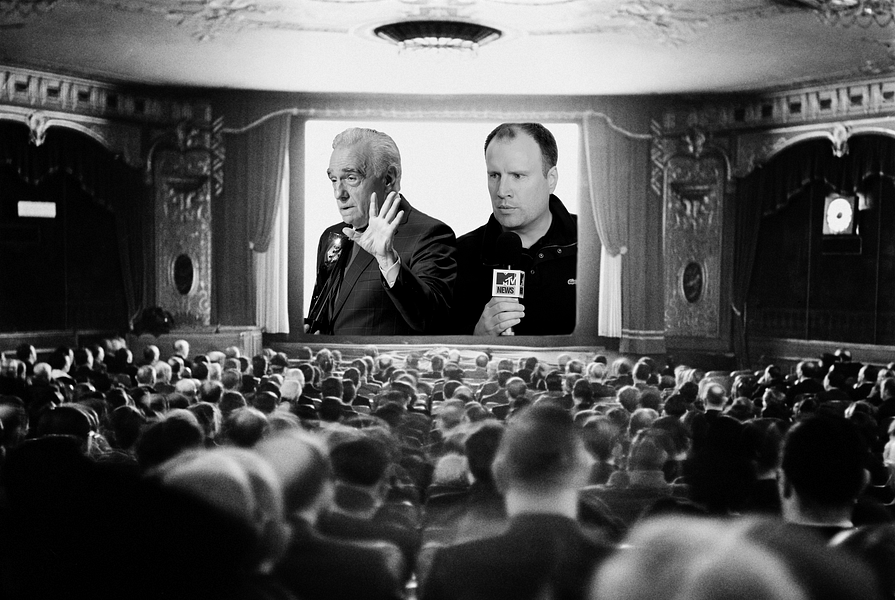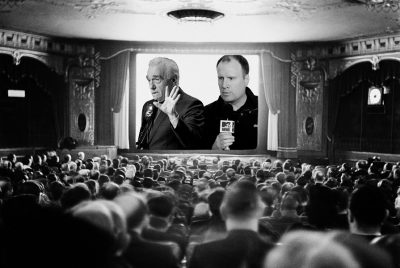Nobody likes a critic. Especially filmmakers, as recent griping attests. Don’t Look Up director Adam McKay rather priggishly observed that if critics didn’t get his movie, it’s probably because they don’t worry enough about climate change or U.S. political troubles. Twenty-five-year-old British millionaire Tom Holland admonished 79-year-old Martin Scorsese since he “doesn’t know what it’s like” to make a Marvel film. (Scorsese had written a politely critical op ed for the New York Times claiming that superhero movies “aren’t for me” and “I don’t think they’re cinema.” This has led to him becoming the studios’ #1 boogeyman.)
A deceptively milder critique of critics was expressed by an animator for the Disney film Encanto who recently argued, “Film critics should talk [more] about how much taste, temperament and expectation make a viewing experience singular, not universal.” He continued at length to contend critics shouldn’t present their opinions as objective or speak with authority.
It’s a nice sentiment, but dead wrong. First of all, subjectivity is implied by the context of a film review. We should all know that. But there’s a bigger point to be made here. The internet is full of bad film criticism—and pompous critics exist—but far more ubiquitous and corrosive than critical over-certainty is a sort of breathlessly enthusiastic headline that has become all too common: “The New Trailer for the Superboy Prequel Reboot Dropped and It’s Everything.”
Uncritical enthusiasm—and absolute insistence that lowbrow entertainment is high art—is the order of the day. We don’t just need to enjoy superhero movies, we need them to be up for Best Picture. The Academy of Motion Picture Arts and Sciences—flailing for relevance—floated a “popular film” category for the Oscars before outcry forced a reversal. Meanwhile, Black Panther and Joker both received Best Picture nominations. A ripoff of Taxi Driver about a comic book character’s antagonist isn’t exactly Citizen Kane, is it?
Look around you: We don’t need more subjectivism. We need more standards. Better standards. Good critics are necessary to help us achieve that. And yes, that means some elitism, because they’ll need to push back on the current populist cinema craze. It means standards.
But aren’t movies about making us feel good? Martin Scorsese may be a great director, but who really wants to rent a Fellini film when the new Spider-Man is playing at the multiplex? As someone with tastes that include plenty of populist pulp content, I’m sympathetic to that argument. And the viewing of art is inescapably an emotional experience, for beauty is not the same as an empirical formula. But it’s too easy to let our emotions run away with us here.
The late British conservative philosopher Roger Scruton wrote that beauty is something which engages both our heart and our mind—our passions and our intellect. Beauty, far from merely being “in the eye of the beholder,” is something which can bear objective analysis. Animals can only chase their appetites. We have the ability to remove our self-interest from the equation and appreciate a thing for itself—not for its “survival value” but because it gives survival value, to paraphrase C.S. Lewis.
By contrast, here’s what Marvel head Kevin Feige has to say about why the films in the MCU deserve Academy notice: “It’s a good thing when people are in a theater and they stand up and cheer. It’s a good thing when people are wiping tears because they’re thinking back on their last 20 years of moviegoing and what it has meant to them.” Artistic value is contained in emotional reaction and nostalgic triggers.
The comment is quite revealing of what Feige sees as the function of his movie series. My dad is a structural engineer in southwest Virginia. He takes art lessons one day a week. His teacher was trying to sell him on abstract art—Dad’s a skeptic—and made the case that it’s about trying to express your feelings. “That’s not art,” Dad retorted. “That’s advertising.” Art should engage our minds and our passions. Marvel films lean heavily into advertising, an experience of the senses. A roller coaster is entertainment. But art, while pleasurable to the senses, is also engaging to the intellect.
Consider the contrast between the latest MCU installment and the earlier film from which it borrows much of its emotional weight. Viewing Spider-Man: No Way Home is like watching a man stagger across a busy street while juggling 15 plates. It’s impressive that it all lands safely, but at the end of the day, it all seemed to fade from memory except for brief bright moments and colors. A movie full of disparate scenes where the lead characters are either in Artificial Quipping mode like an SNL skit or going full Oscar Bait weepy, strung together by blocky functional exposition and Tik Tok style hectic editing.
By contrast, rewatching the Sam Raimi-directed Spider-Man films from the early 2000s made me appreciate anew how warm and insightful their moral universe was. The best thing about No Way Home is that it does finally create real consequences for Tom Holland’s prep school Spidey, but Raimi’s world was one where Peter Parker’s choices had immense personal cost at every step of his journey, not just after he tries to rewrite the universe to get his friends into MIT. He lived in a dinky apartment in Manhattan. He got yelled at by his landlord, fired for failing at an impossible task, and dismissed by his professor as “brilliant but lazy” all while he was out there saving NYC from a crime wave. Aunt May wisely tells him that sometimes adulthood is about forgoing our dreams to do the right thing. Later, he echoes those words to the film’s main villain, who despite the odds, ends up heeding them. That villain dies in spectacular fashion.
No Way Home may have more jokes per minute but check back with me in 20 years. Will it still have the same beloved fan base? In fact, the main reason it works is that it relies on earlier stories, relies on the audience to have gone out and purchased the knowledge necessary to comprehend and feel its plot in the correct way. It’s a massive intertextual advertising initiative.
Good criticism should teach us how to train our appetites toward the good and the beautiful. I’m very grateful for the film criticism I’ve read over the years that has taught me to think more clearly, express myself with greater wisdom, and love art better. It’s pushed me to try new things and I’ve found so many movies that have kept me company and lived in my head and heart.
Most movie discourse is mired in unreflective nostalgic cheering, brand loyalty, silly nitpicking—or tired woke analysis which is a sort of populism-of-the-elites. Film critics should teach us how to think well, which means pushing against those fashions, and talking about objective standards and making authoritative judgments. If you look around at modern society and think “we need more relativism and fewer people appealing to standards,” I don’t know what to tell you.
A counter-argument may be that we hardly need more pompous “experts” telling the rest of us how to think. Conservatives might assume that the only intellectual frames for film analysis are left-wing academic ones, and so abandon the field altogether. With so many excellent right-wing critics contributing to the critical world, that would be a shame. Consider Terry Teachout and Titus Techera discussing Hitchcock’s reflection on marriage in North by Northwest, Sonny Bunch on television, or Bill Ryan on Peter Bogdanovich.
Expertise isn’t transferable. An expert on movies isn’t an expert on cooking. But if I want to be a good chef, I want to learn from someone who knows more about cooking than I do. And a teacher can wear his or her expertise lightly. Indeed, anyone who truly loves their field should be joyful to share its bounties with new converts. After he became Marvel’s Public Enemy No. 1, Martin Scorsese penned a lengthy, heartfelt love letter to cinema and in particular to a director who had inspired him, Federico Fellini.
In it, Scorsese criticizes streaming websites algorithms and writes, “Curating isn’t undemocratic or ‘elitist,’ a term that is now used so often that it’s become meaningless. It’s an act of generosity—you’re sharing what you love and what has inspired you.”
We don’t need critics to start every review cap in hand, begging the audience to respect their totally subjective, not at all authoritative, maybe-not-even-true analysis. That doesn’t mean their tone should be strident, but rather that confidence in a thesis shouldn’t cause a reader to melt into a puddle of insecurity.
It’s true that there can be pretentious critics, but a conservative response to these excesses is not to say critics should yield the entire field as subjective. The answer to bad criticism is good criticism, as the answer to bad elites is good elites.






Please note that we at The Dispatch hold ourselves, our work, and our commenters to a higher standard than other places on the internet. We welcome comments that foster genuine debate or discussion—including comments critical of us or our work—but responses that include ad hominem attacks on fellow Dispatch members or are intended to stoke fear and anger may be moderated.
With your membership, you only have the ability to comment on The Morning Dispatch articles. Consider upgrading to join the conversation everywhere.